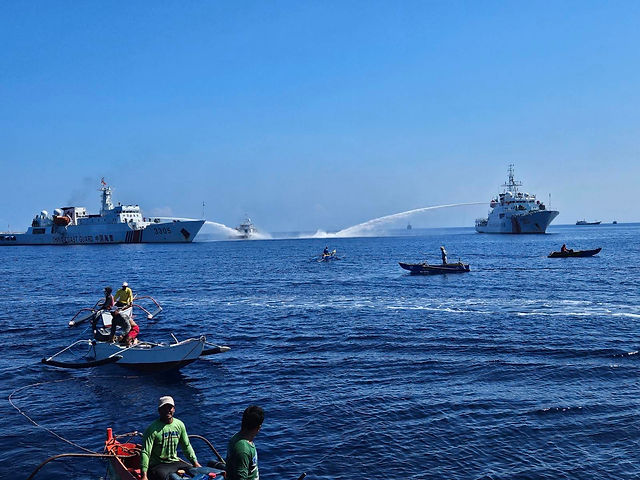The South China Sea, nestled between Southeast Asia and the Pacific, has emerged as a geopolitical hotspot that could have far-reaching consequences for global stability. Understanding the dynamics of the region is crucial in grasping why the South China Sea is perceived as a potential trigger for World War III.
Historical Context
Historical disputes and colonial legacies have laid the groundwork for tensions in the South China Sea. The region's history is marked by competing territorial claims and strategic interests that continue to shape the contemporary geopolitical landscape.
Territorial Claims and Disputes
A myriad of conflicting territorial claims by nations bordering the South China Sea has fueled ongoing disputes. The struggle for sovereignty over islands, reefs, and maritime boundaries has intensified in recent years, contributing to heightened tensions.
Strategic Importance
The South China Sea holds immense economic and geopolitical significance. Its vast waters serve as a crucial conduit for global trade, with nations vying for control over shipping lanes and access to abundant natural resources beneath its depths.
Military Buildup and Power Dynamics
Military posturing and strategic military buildups by nations with vested interests in the South China Sea have altered regional power dynamics. The increased presence of naval forces raises concerns about potential conflict escalation.
International Law and Arbitration
Despite efforts to resolve disputes through international law and arbitration, challenges persist in enforcing decisions and ensuring compliance. The complexities of overlapping claims and historical grievances hinder the effectiveness of legal frameworks.
China's Assertiveness
China's assertive actions in asserting its claims over the South China Sea have been a focal point of tensions. From artificial island construction to naval patrols, China's assertiveness has heightened regional anxieties.
Tensions Among Nations

Tensions among nations involved in the South China Sea disputes are palpable. The historical animosities and contemporary geopolitical rivalries contribute to a volatile environment, with the potential for conflict ever-present.
Potential Triggers for Conflict
Several factors contribute to the South China Sea being a potential trigger for World War III. These include territorial disputes, military posturing, and the complex web of alliances that could escalate regional conflicts into global crises.
Economic Impact on Global Trade
The consequences of a conflict in the South China Sea extend beyond regional boundaries. Disruptions to shipping routes and economic repercussions could reverberate globally, impacting international trade and economic stability.
Diplomatic Efforts and Mediation
Diplomatic efforts to resolve disputes in the South China Sea are ongoing. International organizations and mediators play a crucial role in facilitating dialogue and finding peaceful resolutions to prevent the escalation of conflicts.
Risk Mitigation Strategies
Strategies to mitigate the risk of conflict involve diplomatic, economic, and security measures. International collaboration is essential in establishing mechanisms that promote stability and discourage aggressive actions.
Public Opinion and Media Influence
Public opinion and media narratives can significantly influence the course of geopolitical events. Understanding and managing public perceptions are vital in preventing the escalation of tensions through misinformation or nationalistic fervor.
Lessons from History
Drawing lessons from historical conflicts and resolutions can offer valuable insights. Applying past experiences to navigate the complexities of the South China Sea disputes is essential in preventing a repeat of historical conflicts.
Global Implications of a South China Sea Conflict

A conflict in the South China Sea would have profound implications for global peace and stability. Major global powers have a vested interest in preventing such a scenario, and diplomatic efforts must be intensified to avert a larger conflict.
In conclusion, the South China Sea's potential as a trigger for World War III is rooted in historical disputes, geopolitical maneuvering, and the strategic importance of the region. The international community's collective efforts are crucial in ensuring that diplomatic resolutions prevail over military confrontations.
FAQs
Q. Why is the South China Sea considered a geopolitical hotspot?
Ans: The South China Sea is a hotspot due to competing territorial claims, strategic importance, and historical disputes among nations in the region.
Q. What role does China play in the South China Sea disputes?
Ans: China is a key player, asserting territorial claims and engaging in assertive actions, contributing to heightened tensions.
Q. How do territorial disputes impact global trade?
Ans: Territorial disputes can disrupt shipping routes, leading to potential economic repercussions globally.
Q. What diplomatic efforts are underway to resolve the South China Sea disputes?
Ans: International organizations and mediators are involved in diplomatic efforts to facilitate dialogue and find peaceful resolutions.
Q. How can the global community prevent a potential conflict in the South China Sea?
Ans: The global community can prevent conflict through diplomatic, economic, and security measures, fostering international collaboration and stability.






